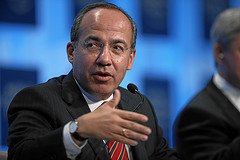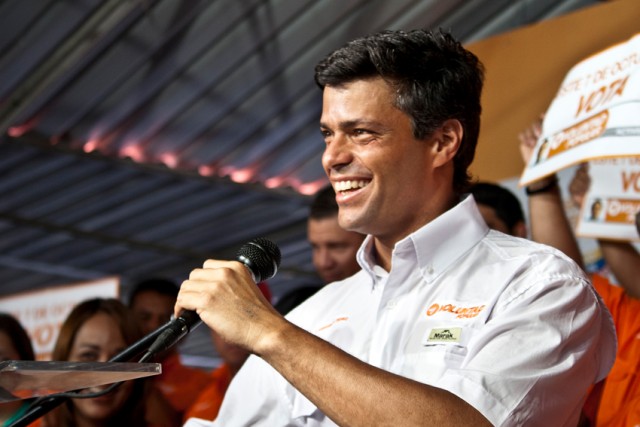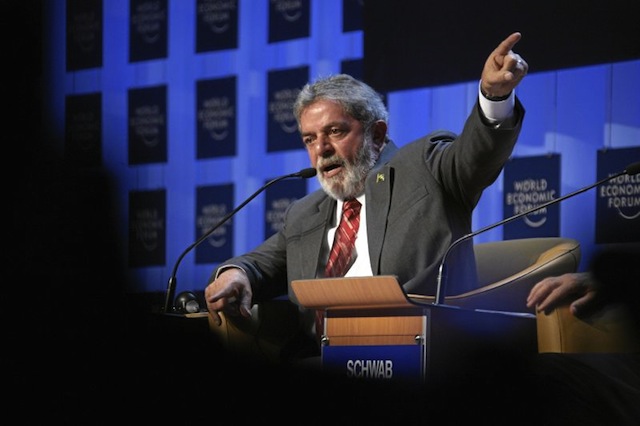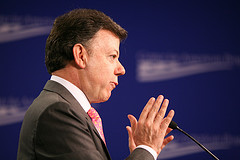
Latin America: Week in Review, North America
Facing Protests in Ciudad Juárez, Calderón Says U.S. Must Reduce Consumption to Stem Mexico’s Drug War Violence
March 17, 2010 By Staff
Today in Latin America
Top Story — Mexican President Felipe Calderón visited the border city of Ciudad Juárez on Tuesday, where he was greeted by hundreds of protesters, according to The BBC. The protesters criticized Calderón for sending the military to clamp down on drug violence, saying that his hardline policies had only worsened the problem.
Calderón’s failure to bring violence under control in Juárez despite deploying 10,000 soldiers there prompted him to call on the U.S. to reduce drug consumption and illegal gun trafficking. Secretary of State Hilary Clinton acknowledged last year that Americans’ “insatiable demand for illegal drugs fuels the drug trade,” but U.S. anti-drug policy toward Mexico remains centered on military assistance provided through the Merida Initiative.
Ciudad Juárez, Mexico’s most violent city, suffered more than 2,600 murders last year. The Mexican federal government recently released figures estimating that the murder rate had dropped 40 percent, but the numbers invited skepticism from citizens of Juárez.
“The numbers we have just seen, frankly, do not correspond to the citizens’ perception,” said Arturo Valenzuela, a representative from the city’s security committee, at the meeting with Calderón.
Calderón’s previously planned visit comes after three people, including two Americans, with ties to the U.S. Consulate were shot to death in Ciudad Juárez. The murders prompted questions about whether Mexico’s allegedly responsible drug gangs have begun to target the U.S. government.
The FBI, which is participating in the Mexican investigation into the killings, has said that it has yet to find evidence indicating that the victims were targeted because of their affiliation with the Consulate.
Just published at the Latin America News Dispatch
Headlines from the Western Hemisphere
North America
- Texas Governor Rick Perry said the state heightened its border patrols due to the escalating violence in northern Mexico.
- Mexico’s gross domestic product is expected to grow 4 percent in 2010, according to the International Monetary Fund.
Caribbean
- Cuba’s “Ladies in White” staged a protest against the imprisonment of 75 political dissidents in 2003.
- The Haitian government will need $11.5 billion to rebuild after the Jan. 12 earthquake, according to the U.N. assessor for natural disaster relief Alejandro Zapata. He recommended that two-thirds of that money should be used to alleviate social inequality.
Central America
- The Inter-American Development Bank decided to resume work in Honduras after suspending operations following the June 2009 coup.
- Costa Rican President-elect Laura Chinchilla said Monday that curbing drug trafficking will be one of her administration’s top priorities.
- Panamanian President Ricardo Martinelli signed a tax bill into law that will reduce the budget deficit and boost revenue
Andes
- Venezuelan President Hugo Chávez says he once met secretly with Raúl Reyes, the second-in-command of the leftist Colombian guerrilla group FARC. Reyes was killed when the Colombian military attacked the Ecuadorian border in 2008.
- The News Chief of Televisa de Zulia, Carlos Roca, was kidnapped in Maracaibo, Venezuela on Monday.
- A United States District Court granted Chevron’s motion to dismiss Ecuador’s request to put a stay on the company’s arbitration against the country.
- Peru might fine the Orient Express Hotels, operators of the Machu Picchu tourist train, up to $10 million for abusive practices.
- Bolivian officials fired a prison director after he let former dictator Gen. Luis García Meza turn prison cells into a luxury apartment.
Southern Cone
- The Catholic Church in Brazil has been engulfed in a sex scandal, with three priests accused of abusing boys and young men in the northeastern state of Alagoas. The controversy began after television station SBT aired a video depicting 82 year-old Monsignor Luiz Barbosa having sex with a young man who worked for Barbosa as an alter boy.
- Paraguayan Congressman Pedro González of the Authentic Radical Liberal Party said he was attacked by gunmen over the weekend, but was not hurt.
- Brazil’s Electrobrás and Uruguay’s UTE signed an agreement to construct an energy network on the Brazilian side of the countries’ border.
- Chilean President Sebastián Piñera said he will use money from the country’s rainy day copper fund to pay the $30 billion in damages from last month’s earthquake.
Image: World Economic Forum @ Flickr.
Subscribe to Today in Latin America by Email







2 Comments
[…] sections’ headlines on Wednesday, as journalists and analysts struggle to figure out how the murders of three people with ties to the U.S. Consulate in Ciudad Juárez will affect the U.S. posture toward […]
[…] – Facing Protests in Ciudad Juárez, Calderón Says U.S. Must Reduce Consumption to Stem Mexico’s Dr… (Latin America News […]
Comments are closed.